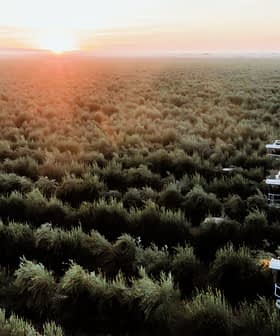Plans Stall for Buenos Aires 'Quality Stamp'
Researchers found that a regional mark to identify local olive oils would add value, but a lack of cooperation among producers has led to inaction.
 Olivares La Reconquista
Olivares La ReconquistaOlive oil producers in the province of Buenos Aires have stalled in an effort to create a stamp of quality — similar to a Protected Designation of Origin — which would identify locally produced extra virgin olive oil and potentially increase the price at which it is sold.
According to Lorena Tedesco, a professor of economics at the National University of the South (UNS) who worked on the project, a lack of organization from the province’s South Chamber of Oliviculture has led to the inaction.
(The goal was to) give producers the tools to evaluate and give them guidance in their business strategies.
After Tedesco and her colleagues helped research the issue and provided advice and guidance to the producers, she told Olive Oil Times that it would ultimately be up to them to implement and organize the program.
Most of the olive oil production in Buenos Aires takes place in the southwest of the province, which is located in the semi-arid and sub-humid Pampas.
See Also:Olive Oil Producers in Argentina Hope to Follow Malbecs LeadDue to the combination of the province’s climate and geography along with a lack of investment in the sector, a relatively small amount of olive oil production takes place in Buenos Aires. In spite of all of this, Mario Fernandez, a local producer and former president of the South Chamber of Oliviculture, said that 2019 had been a good year for local producers, both in terms of quality and quantity.
He said the region produced about 1,250 tons or about three percent of Argentina’s total production in 2019.
However, what the province lacks in quantity, experts believe it makes up with quality.

Olivares La Reconquista
According to research from Susana Picardi, a professor at UNS, the proximity to the ocean, cold winters and thermal amplitude favor the slow ripening of the olives, which leads to a high phenolic content and a high proportion of oleic acid in the resulting oil.
Data like that led to the idea that a locally-produced olive oil could command a higher price than the others sharing supermarket shelves.
See Also:Argentina’s Best Olive OilsBeatriz Lupin, an economics professor at the National University of Mar de Plata who worked on the effort to create the stamp, told Olive Oil Times the goal of the project was to “give producers the tools to evaluate and give them guidance in their business strategies.”
A study conducted by Lupin and her research team in 2017 found that 55 percent of the participants said that they would be willing to pay up to 50 percent more for a bottle of extra virgin olive oil with the local stamp of quality.
From that point, it has been up to the South Chamber of Oliviculture to organize and begin implementing the plan. According to Tedesco, this will be an uphill battle.
A heterogeneous quality of the oils produced in Buenos Aires and the practice of mixing local oils with those from other regions are two of the challenges facing producers and the Chamber in the implementation of the plan.
There are smaller challenges, too, mostly to do with a lack of organization and cooperation among producers.
However, Tedesco pointed out that the ground remains fertile for the creation of a local quality stamp. Demand for high-quality and locally-produced products is growing in the province and, she believes, there is an opportunity for local farmers and producers to profit.








